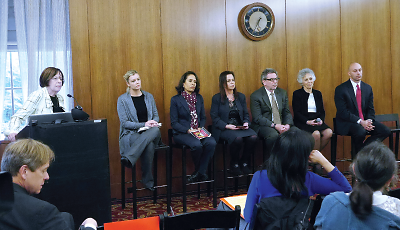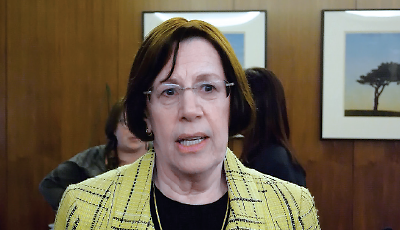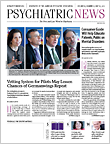While it is reported that an estimated 21 million people are victims of human trafficking—the acquisition of people by force, fraud, or deception, with the aim of exploiting them—experts say that roughly half of these victims will seek some form of health care, especially mental health care.
Last month, health care professionals, law enforcement agents, politicians, and advocates came together for a conference at Weill Cornell Medical College to discuss ways health care professionals might identify and treat victims of human trafficking.
“When talking with people about human trafficking in the United States, I find that most people are surprised that human trafficking is a major issue in this country, but we who have worked with victims of this crime know differently,” Vivian Pender, M.D., an associate professor of psychiatry at Weill Cornell, told the conference attendees. She is also APA’s Area 2 trustee.
There are three forms of human trafficking, which include forced servitude, sex trafficking, and debt bondage (bonded labor). In 2013, the National Human Trafficking Resource Center hotline received multiple reports of human trafficking cases in all 50 states and the District of Columbia. American citizens account for 55 percent of all human trafficking victims throughout the country, according to the U.S. Department of Justice. Women account for 54 percent of all victims, and individuals under age 18 account for 24 percent of victims.
“The entire activity for trafficking is hugely psychological,” Pender told the audience. Pender explained that trafficking victims tend to have numerous psychiatric risk factors, including substance use disorder, bipolar disorder, and a history of family violence, which may make them more vulnerable to criminal activities. She explained to Psychiatric News that it requires psychological understandings to identify a victim or those at risk for victimization, and psychological interventions to help those individuals heal.
“I was forced into human trafficking during the summer before I entered the ninth grade,” said Holly Austin Smith, a conference speaker and author of Walking Prey: How America’s Youth Are Vulnerable to Sex Slavery. According to Smith, after becoming acquainted with a 30-year-old man whom she met at a mall in a suburb of New Jersey, she found herself two weeks later being forced into prostitution at the age of 14—one of the most vulnerable ages for adolescent females to enter sex trafficking, according to the U.S. Federal Bureau of Investigation (FBI).
“I had several predisposing factors that made me vulnerable to human trafficking,” said Smith, who admitted to having low self-esteem as an adolescent and unaddressed emotional issues stemming from molestation during early childhood.
Fortunately Smith was able to escape after being in captivity for two days when she was arrested for prostitution and sent home to her parents. “I was one of the lucky ones,” she stated.
During an interview with Psychiatric News, Ruth Fischer, M.D., a clinical professor of psychiatry at the University of Pennsylvania School of Medicine, said that since 50 percent of victims see a health care professional while in captivity, it is top priority to recognize those victims.
“This is a serious problem,” said Fischer. “Being a victim of human trafficking is very traumatic and we, as psychiatrists, particularly child and adolescent psychiatrists, have to be aware of specific behaviors and not be reluctant to take these victims on as patients,” Fischer emphasized.
Victims of human trafficking may be nervous, depressed, submissive, and/or fail to make eye contact, according to Anthony Bivona, a supervisory special agent at the FBI’s New York Field Office. Patients may also have tattoos, “particularly around the neck area or inside the mouth—these are tags from the traffickers marking their property.”
Fischer said that suspected victims of human trafficking should be interviewed without the person who brought them into treatment because that person—who may be a trafficker—may not allow the victim to speak freely. “This is very threatening to young girls,” said Fischer. “Our goal as mental health care professionals is to develop a very trusting relationship with the young girl so that she may be able to come back for our help.”
Fischer added that it would be of great benefit for psychiatrists to connect with mental health professionals who specialize in dealing with victims of human trafficking so that victims can be referred for the best treatment possible.
As for Pender, she told Psychiatric News that she was pleased with the wealth of information that was given at the conference.“I hope that the conference was able to raise awareness and help health care professionals identify victims of human trafficking. Our long-term plan is to decrease violence in the world, especially violence against vulnerable people like women and children.” ■
A recording of the conference can be accessed
here.


